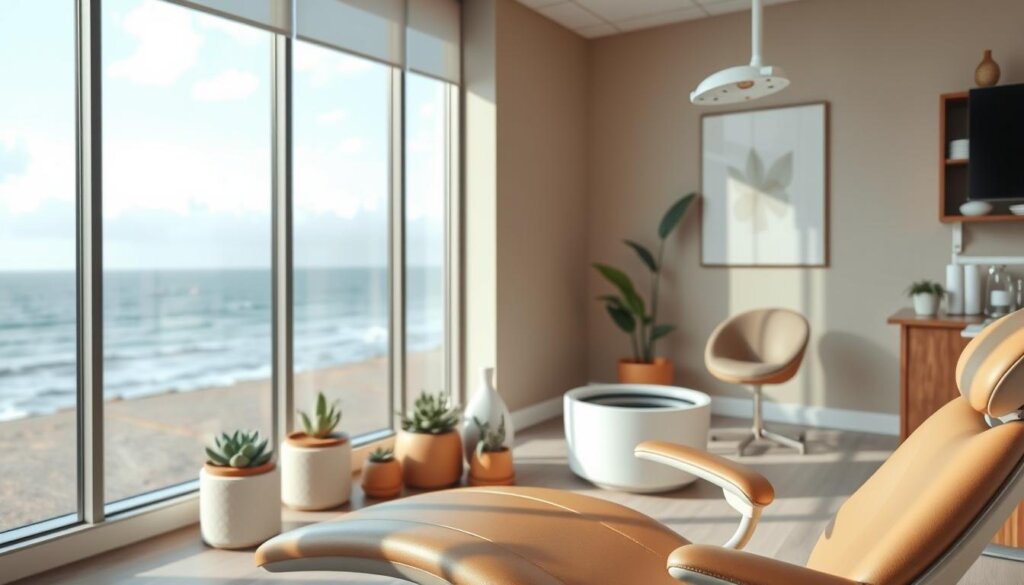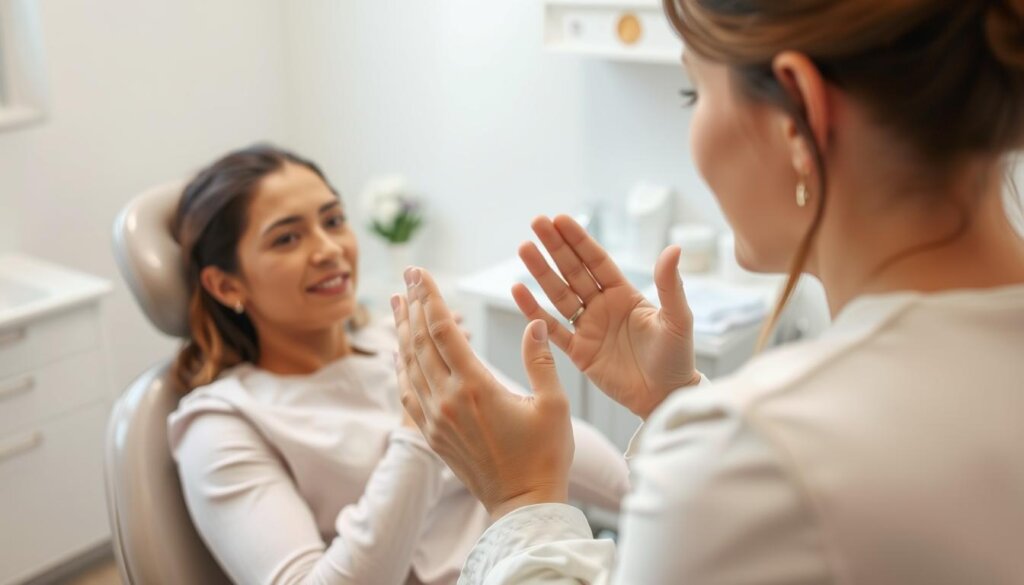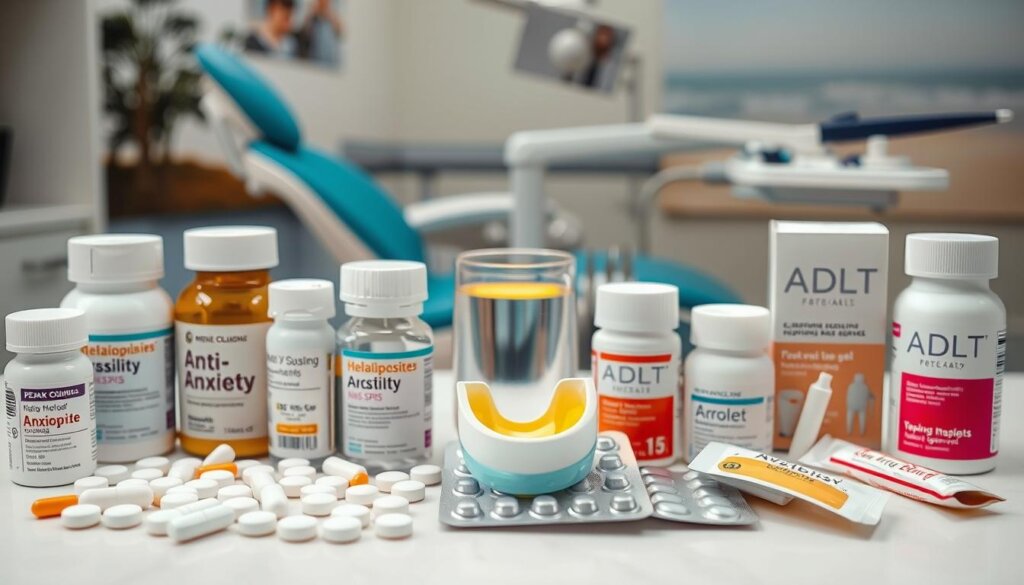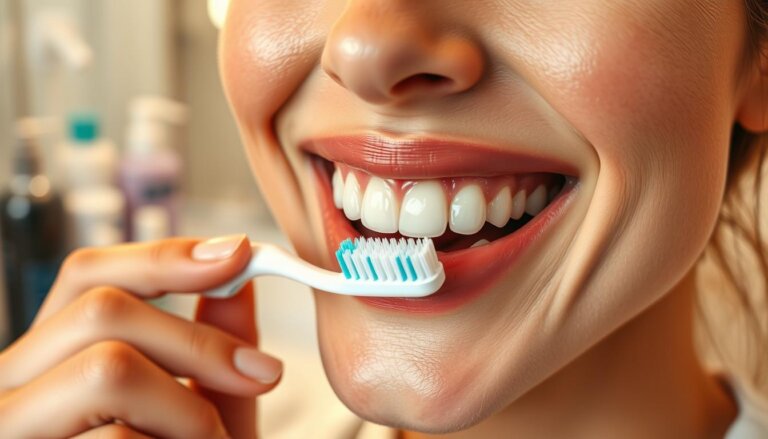Ease Dental Exam Anxiety – Tips & Strategies
Shockingly, over 60% of people experience dental anxiety. This often leads to delayed or skipped dental visits. This widespread fear not only affects their quest for healthy teeth but can also cause serious oral health issues. These problems might need more complex treatments later on. It’s important to deal with this anxiety before dental visits. Relaxation techniques can really change how people view going to the dentist. They can go from being scared to feeling ready.
It might seem hard to handle fear of the dentist, but it’s crucial for your health. Just thinking about going can make someone stressed. That’s why using strategies to feel calmer before and during your visit is important. Techniques like deep breathing and talking openly with your dentist can help. These methods are helpful in beating dental exam anxiety.
Key Takeaways
- Over half of the population endures dental anxiety, emphasizing the need for effective anxiety management.
- Procrastination of dental care due to anxiety can exacerbate oral health problems, highlighting the importance of reducing stress before dental procedures.
- Employing relaxation techniques for dental anxiety can significantly alter the patient’s experience, contributing to a more positive perception of dental care.
- Open dialogue with dental professionals is critical in managing fear of the dentist and ensuring a comforting and supportive environment.
- Understanding personal triggers and seeking tailored solutions are key steps in the journey toward stress-free dental appointments.
Understanding Dental Anxiety
Dental anxiety stops many from getting the dental care they need. This fear can come from different places. It makes it hard for them to keep their teeth healthy. Knowing why people get anxious and how it affects them can help us find better ways to help.
Common Causes of Dental Anxiety
People become scared of the dentist for many reasons. They might worry about pain, hear scary stories, or have bad past experiences. The sounds and smells of a dentist’s office can make this fear worse.
The Impact of Past Experiences
Bad experiences at the dentist can make people more scared later. Painful or upsetting visits make it harder for them to go back. This is why we need special ways to help people handle their fear of the dentist.
The Role of Fear in Dental Care
Fear makes people skip their dental visits. Skipping these appointments can make their teeth problems get worse. This can lead to needing more serious treatments, which only makes the fear stronger.
- Finding out what makes you scared can help create personalized ways to deal with dental fear.
- Talking openly with your dentist can make the visit less stressful.
- New methods for pain relief and sedation can really help reduce fear.
Recognizing Symptoms of Anxiety
Before a dental exam, knowing the signs of anxiety is key. These signs can hugely affect someone’s willingness to see the dentist regularly. It shows why it’s vital to have tips to relax and strategies to deal with fear during dental visits.
- Rapid heartbeat or palpitations
- Excessive sweating
- Shaking or trembling
- Dry mouth
- Nausea or gastrointestinal discomfort
- Fainting or feeling lightheaded
Emotional and Psychological Signs
- Persistent worry or fear about upcoming dental appointments
- Feelings of dread when thinking about dental care
- Compulsion to cancel or postpone dental appointments
- Sleep disturbances leading up to the dental visit
- Feeling emotionally overwhelmed or crying spells
Spotting these signs is crucial for tackling dental anxiety. Using certain methods and getting help from professionals can change a scary dental appointment into something easier to handle. These methods not only help with fear at the dentist’s but also support long-term health and keeping teeth healthy.
Preparing for Your Dental Appointment
Going to the dentist can make some people feel nervous. But knowing the right strategies can help calm these nerves. It helps to learn calming methods before you even go to the dental office. Also, starting to use relaxation techniques early can make your visit much better.
Picking a time for your appointment when you’re not in a hurry helps a lot. Choose a slot when you’re less busy. Plus, getting enough sleep before you go can help keep stress low. This way, these calming strategies work better for you.
It’s a good idea to talk to your dental office before you go in. Ask for a chat before your appointment to talk things over. This time is great for sharing any worries and learning how the dentist makes things comfortable. Knowing what to expect can make you less nervous when it’s time for your visit.
Thinking positively is also key. Picture having an easy time at the dentist to help reduce worry. So, getting ready mentally is as important as getting ready in other ways.
- Choose a calm time for your appointment to avoid feeling rushed.
- Ensure you are well-rested before the appointment.
- Set up a pre-appointment consultation to discuss any anxieties.
- Use positive visualization techniques to anticipate a good experience.
Effective Breathing Techniques
Stressing about a dental check-up? Effective breathing techniques can be key for calming nerves at the dentist. These methods help manage both immediate worry and long-term dental exam anxiety. We’ll look into two effective strategies: deep breathing exercises and progressive muscle relaxation. They’ve been great at cutting stress and making dental visits better.
- Breathe in slowly through your nose, making sure your stomach goes out, and your chest stays still.
- Hold that breath for three seconds.
- Breathe out slowly through your lips, letting your stomach go back in.
- Do this for a few minutes to calm your mind and lessen tension.
Progressive Muscle Relaxation:
- Start with your feet muscles, then move up to your calves, thighs, stomach, and so on.
- Keep the muscles tense for five seconds, then let go and feel the relax.
- Go through each muscle group, ending with your face and head muscles.
Doing these exercises before a dentist visit can really help you stay calm and ready. They prepare you mentally and physically. They lower your heart rate and ease muscle tension, which are common when you’re anxious.
Seeking Support from Friends or Family
Getting ready for a dentist visit can be easier with support from friends or family. They offer both comfort and help you relax before your dental checkup. Talking about your fears with someone supportive can boost your confidence and calm you down.
Talking openly with your close ones about your dental fears is helpful and allows them to support you better during your visit.
Bringing a friend or family member to your dental exam can lessen your worry. It makes everything seem less scary.
Here are some good ways to feel less nervous at the dentist, with help from others:
- Talk about what scares you with people you trust before going.
- Have someone you’re close to go with you, which can make you feel safe.
- Plan something fun to do after the dentist, to take your mind off it.
| Method | Description | Benefit |
|---|---|---|
| Pre-Appointment Discussion | Chat about your dental anxiety days before the visit | Reduces stress through reassurance and understanding |
| Companion Support | Have a friend or family member with you during the appointment | Provides emotional support and a sense of safety |
| After-Appointment Plans | Organize a pleasant activity following the dental visit | Creates positive associations with dental care visits |
With these methods and someone you trust by your side, dealing with dentist anxiety gets easier. Remember, the aim is to make the dentist visit okay, or even positive, not just something to get through.
Using Distractions During the Exam
Dental visits can be scary. But using distraction methods at the dentist can really help. These methods make you think about something else, so you’re not focused on the dental work. This makes the visit easier for you.
One good way is by listening to relaxing music for dental anxiety. Most dental offices have noise-canceling headphones. Or you can use your own device to listen to music or podcasts. This helps by blocking out scary dental sounds and offering a nice escape.
- List of Relaxing Music or Podcasts
- Classical melodies known for their soothing properties
- Nature sounds and ambient music to promote relaxation
- Guided meditations or storytelling podcasts
Visual focus methods are also helpful. They help you calm your mind during dental work. By thinking of different things, you’re less focused on the procedure.
Thinking about something else or picturing a calm place can help reduce anxiety.
Overall, these distraction methods at the dentist are important. They help reduce fear, making dental visits easier for worried patients.
Exploring Relaxation Techniques
Many feel nervous about dental visits. Using proven relaxation methods like visualization techniques for dental anxiety and mindfulness for dental exam stress can help calm these fears.
Visualization lets people mentally escape to a calm place. This helps those scared of dental work feel far from it. It provides short-term relief and helps with long-term anxiety.
Mindfulness means staying in the present and accepting feelings without judging them. Focusing on breathing or sensations helps reach a peaceful state. This makes it easier to handle stressful dental procedures.
Using both visualization techniques for dental anxiety and mindfulness for dental exam stress lets patients manage their fears. These strategies can make dental visits less scary and sometimes even okay.
Medication Options for Dental Anxiety
Managing dental anxiety might mean looking into medication, especially if the anxiety is severe. Medications can help make dental visits easier and less scary. This can make a big difference for those who dread going to the dentist.
Antianxiety meds are often used to help calm nerves before and during dental work. They range from mild to moderate sedation, depending on how much is taken. It’s vital to talk with your dentist about these meds. This way, you’ll know the pros and cons of each one.
- Benefits: These meds can lessen both body and mind signs of stress, making dental work smoother. They’re easy to use, work quickly, and the dose can be adjusted for each person.
- Risks: However, like all meds, they can have side effects like feeling sleepy, dizzy, or sick. Also, there’s a chance of becoming too reliant on them if used too much. So, it’s crucial they’re taken with a dentist’s advice.
It’s important to have a talk tailored to your health and how anxious you feel about dental visits. A custom plan can bring out the best results while keeping risks low.
Cognitive Behavioral Therapy (CBT)
Cognitive-behavioral therapy, known as CBT, is great for dealing with many types of anxiety. This includes CBT for dental anxiety. It works by changing how we think and react to stress. This makes it a powerful tool for people scared of going to the dentist.
This method even helps with cognitive therapy for dentist fear. It targets the negative thoughts that make anxiety worse. By changing these thoughts, people start feeling better about dental visits.
It’s key to find a therapist skilled in CBT for dental anxiety. They should know how to apply specific techniques to conquer dental fears. A therapist familiar with cognitive therapy for dentist fear can offer special strategies that help a lot.
When searching for a therapist, ask about their experience with dental anxiety. Make sure they’re trained in using CBT for this issue. A therapist who knows about dental fears can provide better support.
- Research therapists with a background in dealing with phobias and anxiety.
- Check the therapist’s credentials to ensure they are certified in practicing CBT.
- Seek recommendations from healthcare providers or reviews from other patients who have successfully managed dental anxiety through CBT.
CBT doesn’t just help with current dental anxiety. It also teaches people how to deal with future stressors. Over time, they become more resilient and positive towards dental care.
Choosing the Right Dental Practice
Finding the right dental clinic can really make dental visits better. It’s key to pick one where dentists specializing in anxiety are there. They know how to make you feel calm, making each visit easier.
When you’re finding a compassionate dentist, looking at reviews and what others say helps a lot. What other patients say can guide you and confirm you’re choosing well.
- Make sure the dentists have the right skills and training to handle dental fears.
- Look for patient stories that talk about how friendly and understanding the dentists are.
- Think about how welcoming the clinic feels, as a comforting space helps reduce stress.
Choosing a dental office that focuses on making patients comfortable is very important. This shows why dentists specializing in anxiety and good reviews are crucial in finding a compassionate dentist.
The Importance of Communication
Good talk between patients and dentists is a major part of successful dental care. This is very true for those feeling nervous about dental visits. Knowing how to talk during a dental visit makes everything better. It makes patients feel safe and understood.
Being open about your dental fears is important. It’s not just about sharing. It’s about working together on your dental health. Communicating dental fear helps make your treatment fit you better. It also makes sure everything is done in a way that’s comfortable for you.
For example, talking about your worries might bring up using a signal system. With this, you can signal if you need a break during treatment. This gives patients power. It lets them control the speed of their dental care.
Also, knowing the dental visit communication strategies your dentist uses makes things less scary. It helps you understand what’s happening. This knowledge not only makes you feel better but also teaches you how your dentist is looking out for you.
So, it doesn’t matter if you’re going for a regular check-up or a big procedure. Good communication can change a stressful dental visit into a positive and easy experience.
Aftercare: Managing Post-Exam Anxiety
Facing post-dental exam worry is key for good long-term dental health. Thinking about how one feels after a dental visit can help lessen stress and make next times better. We’ll look at useful post-dental exam anxiety management ways and smart dental care follow-up strategies.
Reflecting on the Experience helps patients think about their visit. This aids in making sense of fears and remembering the good parts. A big part of this is knowing what made you anxious and seeing how you’ve gotten better at handling fear.
Planning for Future Appointments helps keep getting better. Choosing good experiences to follow up on, picking less busy times for visits, and maybe having more but shorter check-ups can make going to the dentist feel more normal and less scary.
| Strategy Type | Benefits | Implementation |
|---|---|---|
| Post-Appointment Reflection | Reduces anxiety by understanding triggers | Journaling or discussion with a counselor |
| Scheduled Follow-ups | Normalizes dental visits, reduces fear | Regular appointments at preferred times |
| Reinforcement | Increase in positive dental care associations | Create rewards for accomplishing dental care milestones |
Using these dental care follow-up strategies based on personal experiences helps fight dental anxiety in a way that’s right for you. This active thinking and planning improve not just peace of mind but dental health too.
Long-Term Solutions for Dental Anxiety
In the field of regenerative medicine, beating dental fear is key to keeping your mouth healthy. Our plan for the long haul is to make regular dental visits a habit. This idea is not only about getting used to sitting in the dental chair. It’s also about making the dental office a place that feels safe. Over time, this helps lessen the fear people feel.
Regular Dental Visits to Build Comfort
Making dental anxiety less intense means getting to know your dental care team well and having good experiences at the dentist. Going to the dentist often builds trust and makes you comfortable with what happens there. This helps reduce nervousness slowly. As appointments become more predictable, fear decreases, giving patients a sense of control.
Developing Positive Associations with Dental Care
It helps to reward yourself after a good dental visit to start feeling positive about dental care. This way of making dental visits something to look forward to can change dread into something helpful. It makes people more likely to take care of their teeth. In the end, a steady, patient approach is the key to better dental health and feeling better overall.









